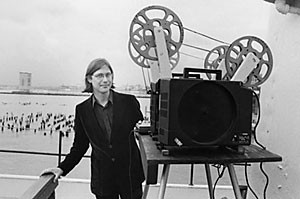Editor’s Note: This is a new feature that will regularly appear in GoWild highlighting a particular artist’s achievements.
Who: Filmmaker Joel Schlemowitz
What: Three of his award-winning experimental documentaries will be shown Saturday at 8 p.m. at The Screening Room, 127 E. Congress St. He will also be showing films at 10 a.m. Monday in the Harvill building, Room 104 as part of a course on experimental production. Both events are free and open to the public.
Bio: Schlemovitz has made more than 40 experimental shorts, which have been shown at numerous festivals around the world and even at the Museum of Modern Art. He is a professor at the New School in New York.
Wildcat (W): What inspires you?
Schlemowitz (S): I tend to be curious about a wide range of other people’s work in different styles, different approaches. Basically anything that isn’t a product of the entertainment industry.
W: What art inspires you?
S: Gustave Moreau.
W: What artistic mediums do you work in?
S: As a filmmaker, I primarily work in 16 mm film. It’s lush, concise, precise, but also allows for the sort of artistic intervention (you can scratch images onto it) that really brings pleasure to the art-making.
W: What makes you a unique artist/gives you a unique voice?
S: I’ll leave it to others to decide what an artistic voice means.
Lately, I’ve been making work that straddles experimental and documentary. I’ve always been fond of that phrase Millennium Film Workshop uses to describe its screening serieS: “”personal cinema.””
W: What is your most recent work?
S: “”New School Union Diary.”” It just recently received the award for Best Documentary Short at the Chicago Underground Film Festival. It’s a diary film shot over the first year of our forming a faculty union at the New School in New York, where I’ve taught filmmaking the past nine years.
W: When did you start making art?
S: As a filmmaker I really was bitten by the bug when I saw Marie Menken’s short experimental films at the Collective for Living Cinema in New York, a venue that sadly no longer exists. From there I discovered the Film Makers’ Cooperative and their amazing collection of avant-garde films. It was seeing this type of small, personal cinema that made the making possible. Making a feature film is like building a house from scratch. Making a three-minute film is more like sitting down to write a poem.
W: What piece that you’ve done are you most proud of?
S: Making any work of art is a challenge. I’m forgiving even of the ones that don’t come out, although I tend not to want to screen them.
W: Do you collaborate with other artists?
S: I’ve done a few “”correspondence films”” shooting a roll of film with someone else in Seattle or Boulder, Colo., and sending it back and forth from Brooklyn, N.Y. The Tucson one is still in progress.
W: What do you think of Tucson?
S: Back in New York last weekend we just had a foot of snow. I’ve never been to Tucson before, but this seems like the right time to be here.
W: What’s next for you?
S: The New York Underground Film Festival in March. A definitely filmmaker-friendly place.









